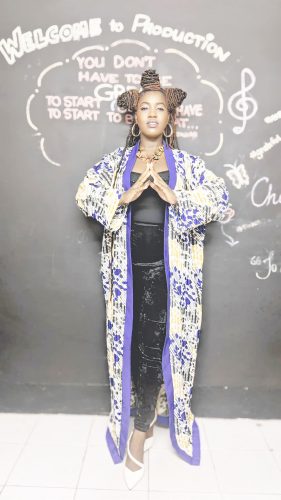Beset by significant online harassment since filing a copyright infringement lawsuit against One Communications, singer, songwriter and artist Jackie Hanover, known as Jackie Jaxx, has taken a step back from social media to focus on her mental health.
While her determination to protect her intellectual property has made her the face of the copyright reform movement in Guyana, she noted that it has also been an enormous responsibility. She expressed concern over the lack of awareness among Guyanese about their rights and the ongoing challenges faced by local artists.
“One of the hardest realities I’ve faced is seeing how undereducated many Guyanese are about their own rights. Instead of supporting efforts to bring about positive change for us, many will fight the people fighting for our rights. I’ve written letters to key figures within Guyana’s government to hopefully discuss these policy reforms that would benefit all of us,” she told this newspaper in an interview. She urged fellow Guyanese to advocate for their rights, emphasizing the importance of supporting artists who contribute to the nation’s cultural identity.

“Since filing the copyright infringement case, I’ve stayed inside my apartment for over a month because of the overwhelming harassment I’ve received online. You would believe I was caught lining my pocket with Guyana’s oil funds – when in reality, I’m holding a corporation accountable for exploiting my work to build their multimillion-dollar business,” she related.
Hanover and Ivan Harry performing as D’Ivan jointly filed a copyright infringement lawsuit in the US Eastern District Court, New York against telecommunications giant One Communications (Guyana) Inc and singer Tennicia De Freitas, known as Nekeita.
According to a press release from Hanover and Harry, the lawsuit alleges that the defendants used their songs “Guyana” and “Oh Guyana” without permission during a rebranding event for One Communications on September 6, 2024. The plaintiffs claim that their musical works were broadcast and commercially exploited without consent, leading to significant profits for One Communications at their expense.
The release said that the lawsuit was filed after efforts to resolve the dispute with One Communications failed. In a pre-action letter to One Communications, shared on Hanover’s Facebook page, attorney Vivian Williams outlined key allegations, including that One Communications solicited De Freitas to perform “Guyana” without the knowledge or consent of his clients. The letter asserted that the unauthorised performance aimed to enhance One Communications’ brand and economic position while broadcasting the performance across multiple platforms, reaching audiences in the US particularly in Brooklyn and Queens.
According to the lawyer’s letter, his clients were willing to accept a monetary settlement of US$250,000 as well as a commitment from One Communications to refrain from any further infringements of their intellectual property rights. In addition, they asked that One Communications commit to work on advocacy and awareness of intellectual property rights in Guyana for a year and a public apology as well as similar commitments from DeFreitas. The letter, dated September 12, warned that legal proceedings would be filed if a settlement was not finalised within ten days.
Meanwhile, according to the press release, in the lawsuit, the plaintiffs are seeking actual damages of no less than $300,000; injunctive relief to prevent further unauthorised use of their songs; disgorgement of profits obtained from the infringement; punitive damages of at least $1 million for the defendants’ alleged willful misconduct; and legal fees.
Additionally, the lawsuit addresses broader concerns in the music industry about copyright protections and the exploitation of independent artists by larger corporations. Hanover and Harry argue through their lawyers that the defendants’ actions have harmed their relationships with potential collaborators, suggesting a deliberate attempt to undermine their business prospects and secure an unfair market advantage.
The lack of modern copyright laws in Guyana has significantly impacted local artists, leaving them vulnerable to exploitation and theft of their work. Many artists report rampant copyright infringement, which undermines their ability to earn a living from their creations. This situation has led some to leave the country in search of better opportunities elsewhere.
Hanover stated that despite reaching out to government officials, thus far only Shadow Minister of Culture Nima Flue-Bess had responded positively.










